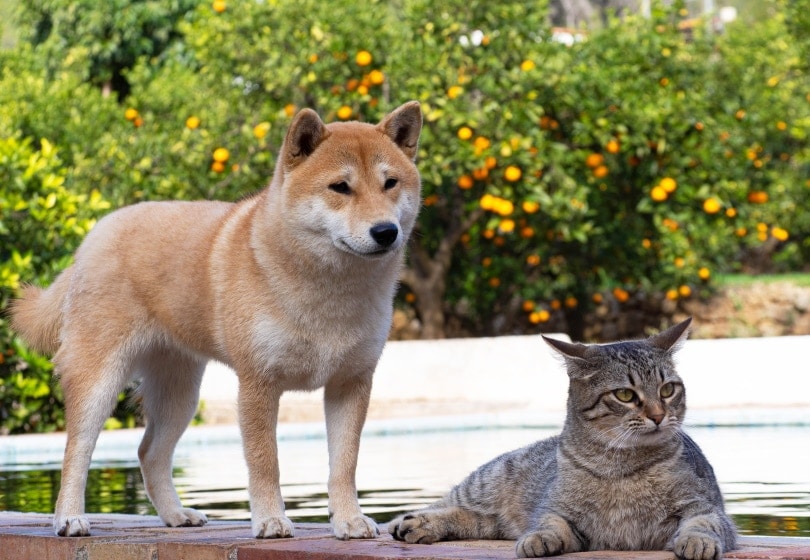Bernedoodle vs Bernese Mountain Dog: Notable Differences (With Pictures)
By Kit Copson
Updated on
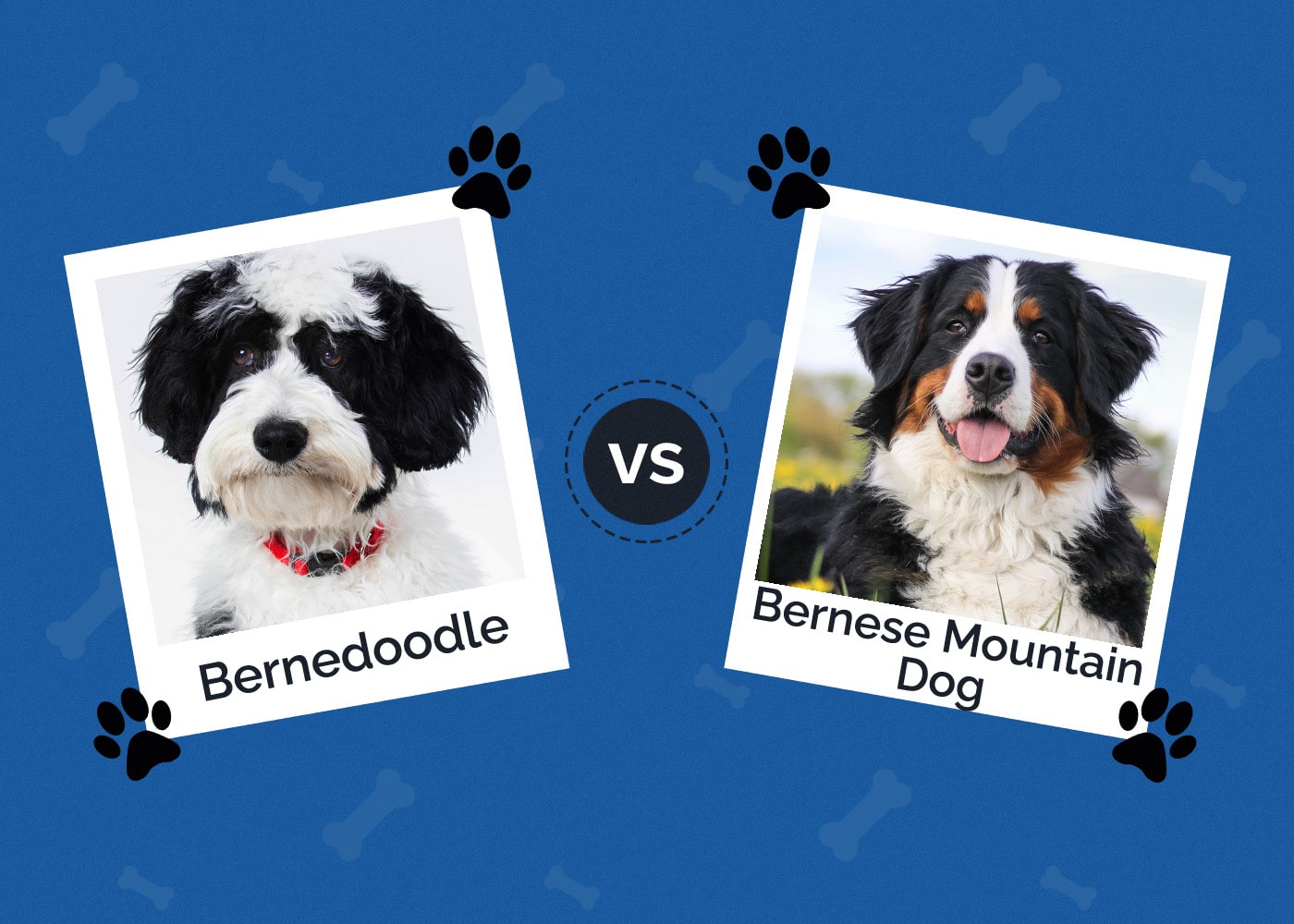
The Bernese Mountain Dog is a very old breed whose ancestry dates back around 2,000 years. They descend from Roman mastiff-type dogs that later ended up in Switzerland where they were bred as versatile farm hands, performing tasks like herding cattle, delivering dairy produce by pulling carts, and keeping a watchful eye out for potential predators and intruders.
In 2003, the Bernese Mountain Dog was crossed with Poodles to create the Bernedoodle, a dog that shares many of the Bernese Mountain Dog’s best traits but was bred specifically for companionship and is considered more allergy-sufferer-friendly (beware, though—some may have coats more similar to the Bernese Mountain Dog, which means they would shed more).
If you’re having trouble choosing between the Bernese Mountain Dog and the Bernedoodle, we hope that this post can answer all your questions and give you a clearer picture of which one would be right for you.
Visual Differences
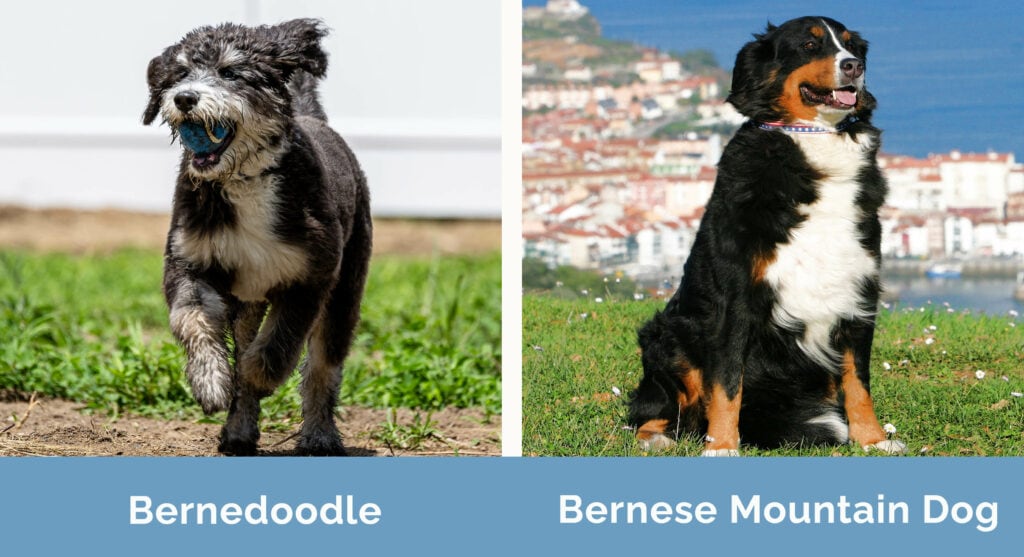
At a Glance
- Average height (adult): 25–27.5 inches (male), 23–26 inches (female)
- Average weight (adult): 80–115 pounds (male), 70–95 pounds (female)
- Lifespan: 7–10 years
- Exercise: 1+ hours per day
- Grooming needs: Moderate to high
- Family-friendly: Often very, with socialization
- Other pet-friendly: Yes, with socialization
- Trainability: Enjoys training sessions, quick to learn, requires patient and consistent leadership
- Average height (adult): 23–29 inches (standard), 18–22 inches (mini), 12–17 inches (tiny)
- Average weight (adult): 70–90 pounds (standard), 20–45 pounds (mini), 10–24 pounds (tiny)
- Lifespan: 12–18 years
- Exercise: 1+ hours per day
- Grooming needs: Moderate
- Family-friendly: Often very, with socialization
- Other pet-friendly: Yes, with socialization
- Trainability: Smart, likes to be kept busy, needs plenty of positive reinforcement
 Bernese Mountain Dog Overview
Bernese Mountain Dog Overview
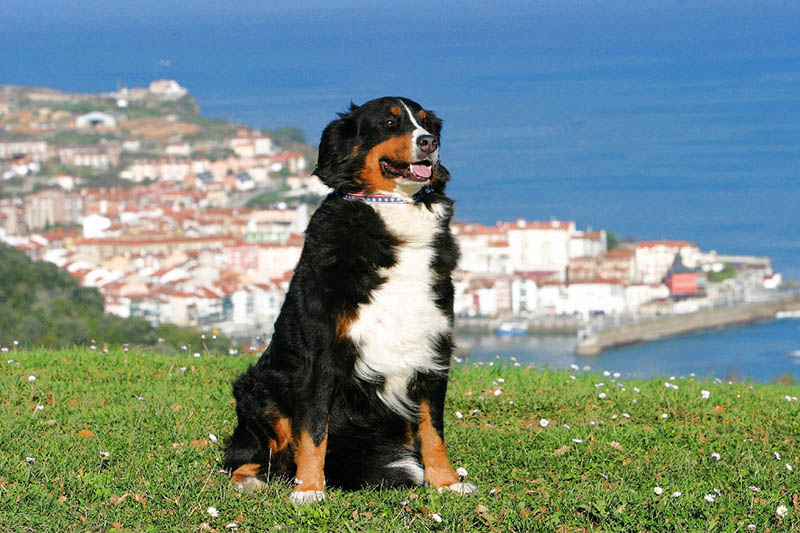
The Bernese Mountain Dog is a large purebred dog that was first recognized by the American Kennel Club in 1937 and is a member of the working group. They currently rank at number 20 out of 284 on the AKC’s popularity ranking. Let’s explore what it’s like to live with one of these gentle giants.
Personality
When considering a dog’s personality traits, it’s important to remember that you can never truly know what a dog is like until you meet them in the flesh. The information here is just based on generalizations about the breed.
The Bernese Mountain Dog is best described as a dog that’s as big and beautiful on the inside as they are on the outside. Their working history has instilled in these dogs a hardiness coupled with a “can do” attitude and a real sense of devotion toward their humans.
Bernese Mountain Dogs are known as gentle souls that, when properly socialized, get along well with everyone in the family including children. They also often get along with other dogs and likely other pets in the household, too, with proper socialization.
Though your Bernese Mountain Dog will likely get along well with everyone at home and enjoy everyone’s company very much, they might get particularly close to one person in the family as these are dogs that thrive on deep bonds and are very devoted to their “leader”.
Training
Bernese Mountain Dogs are the ultimate people pleasers, which makes them easier to train than breeds more prone to willfulness. They’re the kind of dogs that will view training as an opportunity to bond with you and spend time with you, and balance and boundaries really help the hardworking Bernese Mountain Dog thrive. They love being given a job to do, a trait that harks back to their working roots.
Nevertheless, if you’re not used to training dogs, you might want to work with a professional trainer or go to obedience classes. Though Bernese Mountain Dogs are really lovely, often docile characters, they’re still big and powerful dogs. Learning positive discipline and how to harness their energy is all the more paramount for larger dogs.
Always avoid harsh punishments—this is damaging to the bond you have with your dog and will make them reluctant to continue with training sessions. Use positive reinforcement techniques instead.
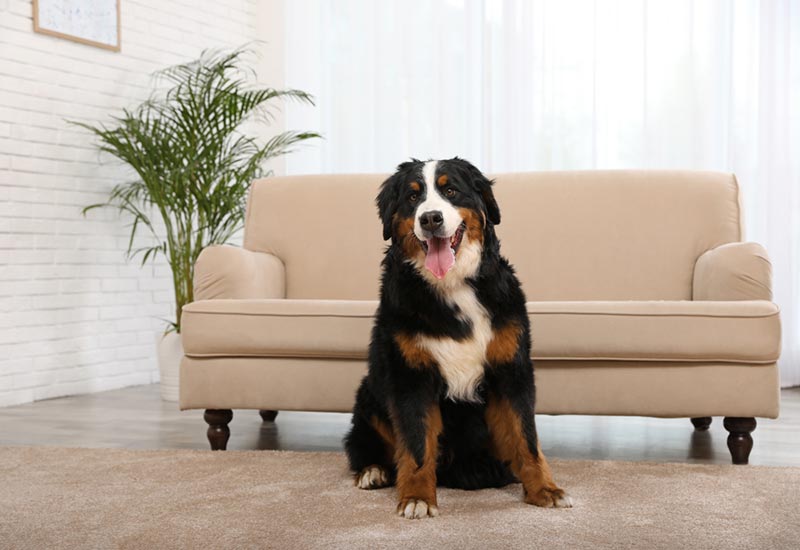
Health Concerns
Bernese Mountain Dogs have an estimated lifespan of 7–10 years. Their general health status is considered by experts to be pretty good, but there do have the potential to develop certain conditions.
Bloat, for example, is a risk for all dogs but especially for large, deep-chested dogs. In its most severe form, bloat turns into gastric dilation-volvulus (GDV), which can cut off blood supply to the stomach and other organs and vessels. This is a fatal condition if treatment is not sought promptly. In addition to bloat and GDV, Bernese Mountain Dogs are also susceptible to:
- Hip dysplasia
- Elbow dysplasia
- Various types of cancer
- Histiocytic sarcoma
Grooming Needs
You can expect your double-coated Bernese Mountain Dog to be a heavy shedder, especially during spring and fall. During these seasons, you’ll likely need to whip out the brush on a daily basis. Regular nail trimming, tooth brushing, and ear checks and cleaning make up the rest of the Bernese Mountain Dog’s grooming needs.
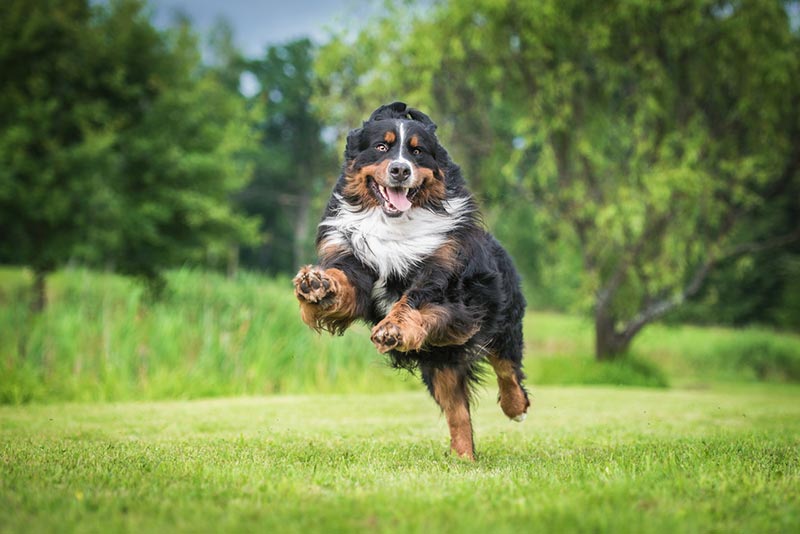
Suitable For:
The Bernese Mountain Dog needs to be with a family that will show them plenty of love and appreciation. They have hearts of gold and can be sensitive to feeling neglected and not getting enough positive reinforcement during training. Bernese Mountain Dogs need to truly feel like part of the family. Moreover, they’re best suited to people who can provide them with plenty of space to exercise.
Bernedoodle Overview
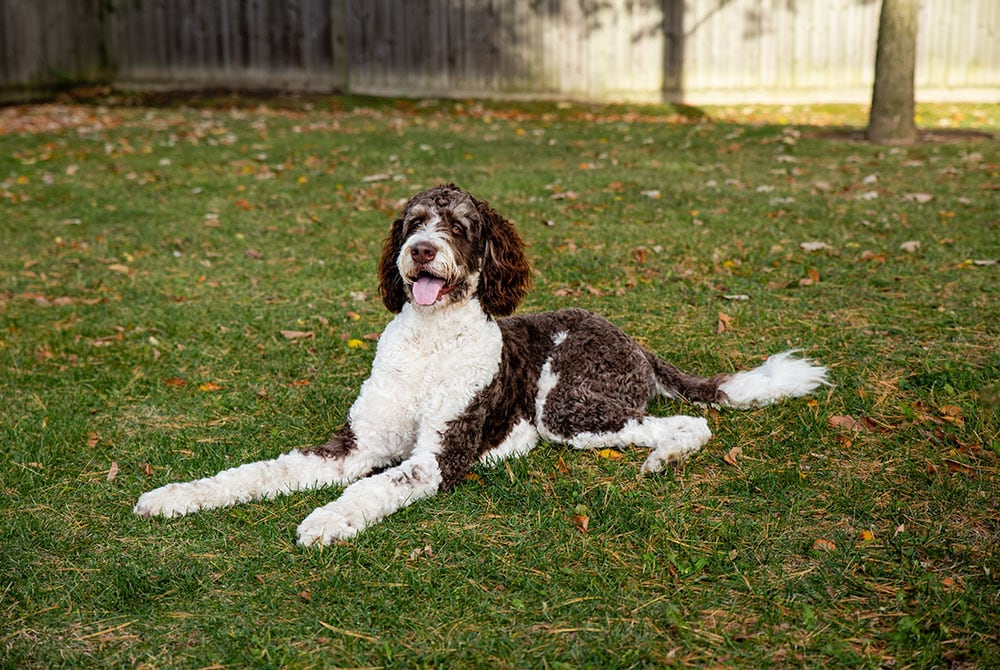
The Bernedoodle is a modern breed that was developed as a companion dog. In terms of appearance, there’s room for plenty of variety because the Poodle—one of the two parent breeds—has a diverse range of color possibilities. They can also come in various sizes because this is also the case with Poodles. Sizes include standard, mini, and tiny.
Personality
Since they were bred for companionship, Bernedoodles make the perfect pal for everyone in the family. The best traits of the Bernese Mountain Dog and the Poodle are very evident in the Bernedoodle, as they’re generally considered placid, highly intelligent, friendly, and have a great sense of humor—a trait passed down from both parent breeds, but especially the Poodle.
Furthermore, Bernedoodles really enjoy playing and are known for their tendency to goof around, which is part of what makes them so endearing. This wonderful temperament makes the Bernedoodle an ideal candidate for therapy dog training programs.
Training
Due to inheriting the sharp Poodle and Bernese Mountain Dog brain, the Bernedoodle is a quick learner when it comes to training. They have a lot of energy and may be a tad willful as puppies, but with consistency and patience, the Bernedoodle will soon start to get on board with training.
One thing that often motivates the Bernedoodle is having a job to do—a trait inherited from the Bernese Mountain Dog. You can use this to your advantage by giving them safe objects to carry, things to find, and by playing games like hide and seek—a game that helps teach your dog to pay attention to where you are.
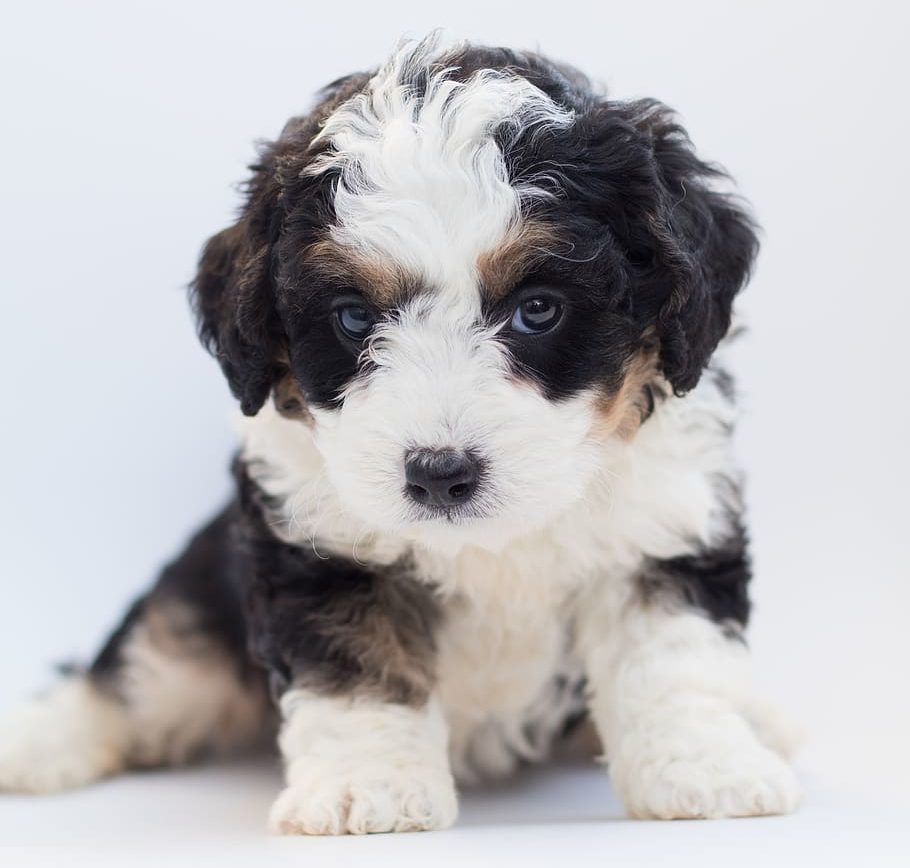
Health Concerns
Though mixed breeds are often considered hardier in the health department, as Dr. Jerry Klein, CVO explains, any dog has the potential to develop health conditions whether they’re mixed breed or not.
Though it’s hard to pinpoint exactly which health issues a mixed-breed dog might be susceptible to due to the diversity in parentage, a study has revealed that certain conditions (including those below) are as likely in mixed breeds as they are in purebred dogs.
- Mast cell tumors
- Heart conditions
- Hip dysplasia
- Lens luxation
- Lymphoma
Grooming Needs
It’s not easy to predict exactly what kind of coat your Bernedoodle will have because Poodles are not big shedders whereas Bernese Mountain Dogs are. If it’s more like the Bernese Mountain Dog’s coat, you can expect them to shed more than if their coat is closer to the Poodle’s. Whatever the case, your Bernedoodle should be brushed at least a few times per week to prevent matting and tangles.
The Poodle-type coat is also more suitable for people who are allergic to pet dander, whereas the Bernese-type coat is more likely to trigger an allergic reaction. Apart from brushing, the grooming needs for a Bernadoodle are the same as those of a Bernese Mountain Dog—regular nail trimming, ear cleaning, and tooth cleaning are important for keeping them comfortable.
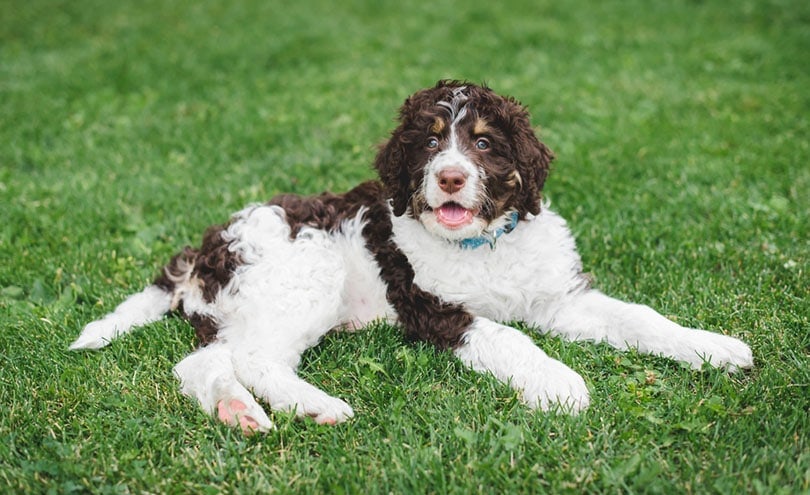
Suitable For:
The Bernedoodle is suitable for anyone looking for a faithful companion with whom you can have a lot of fun. This crossbreed may also be better suited to allergy sufferers than the Bernese Mountain Dog (if they have the curly/wavy Poodle-type coat, that is), due to not shedding as much.
The Bernedoodle is also more diverse in terms of size, so you might consider a Bernedoodle if the Bernese Mountain Dog’s large size is too much for you.
Which Breed Is Right for You?
The Bernese Mountain Dog and Bernedoodle are both very affectionate, faithful dogs when properly socialized. They’re both big on character and have a lot of energy and love to share around, which can make the decision tricky.
If you’re looking for a smaller dog, you might want to go for a Bernedoodle because they come in various sizes. The Bernedoodle may also be a better choice for allergy sufferers because they usually shed less than the Bernese Mountain Dog (the operative word here is “less”—all dogs shed allergens to a certain extent). That said, some Bernedoodles inherit the heavy-shedding Bernese Mountain Dog coat.
See Also:
- Bernese Mountain Dog vs. Great Pyrenees: Learn to Know the Difference
- Labradoodle vs Bernedoodle: The Differences (With Pictures)
Featured Image Credit: (L) Diane Diederich, Shutterstock | (R) Eve Photography, Shutterstock

 Bernese Mountain Dog Overview
Bernese Mountain Dog Overview
